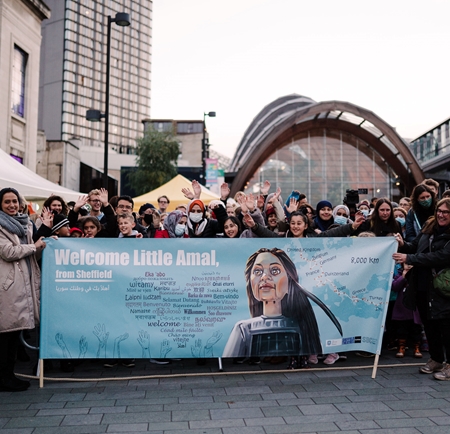

Civil society
The term 'civil society' has a full Wikipedia page for those wanting to research it further, and there is also a lengthy document published by the Government that you can download and read too for a huge amount more information.
In simple terms though, we try to understand it as people coming together to change things for the better, without asking for permission or waiting for someone else to get a plan together. It's based on actions; and specifically requires collaboration to make progress.
It frequently includes charities, co-operatives, community interest companies (CICs), charitable incorporated organisations (CIOs) and social enterprises (private companies with social objectives) - basically any not-for-profit groups doing work for the common good.
Our voluntary sector
This sector is a hugely contributing factor in the friendliness and diverse nature of Sheffield's population - and this video, filmed in 2020 in partnership with Now Then, sought to champion what they do.
We believe Sheffield has a very strong civil society. Which isn't to say it's perfect - there's plenty of friction and disagreement, often with the public sector because of regulations and laws in place that can seem to prevent getting things done at pace. So to change - and support civil society better to fulfil functions that either can't be provided by public or private sector, or aren't relevant to be provided by those sectors - we need to understand more.
We know from the last State of Sheffield report that there are approximately 3,300 voluntary and community groups alone in the city. But what does this mean for our economy? For our health and wellbeing? For Sheffield as a place to live, work, study or visit? We don't believe a city has ever carried out any reports or analyses of this before, but we have started to do so. Because we believe that perhaps this is one of the reasons why Sheffield is such a unique place and why people love it so much.
Below are some examples of civil society in action in the city. We will be trying to update this with subsequent examples as much as we can, as well as publish our report once it is available.
Examples of Civil Society in action
Universal Basic Income (UBI)
A Universal Basic Income, or UBI Lab is a citizen-led group exploring and advocating for Universal Basic Income. What many people don't know - even if they might have heard about UBI as a concept - is that it is borne out of Sheffield and facilitated by the social enterprise Opus.
Cohesion and Sanctuary
In 2007, with the support of the City Council, Sheffield became the UK’s first ‘City of Sanctuary’ for asylum-seekers and refugees—demonstrating our pride in the welcome we offer to people in need of safety.
Sheffield Lakeland Landscape Partnership
The Sheffield Lakeland Landscape Partnership offers a unique opportunity to manage the heritage of the place of outstanding natural beauty.
Carbon neutral by the end of the next decade
Sheffield is committed to becoming carbon neutral by the end of the next decade. We've committed to shortening our original target by 20 years, declared a Climate Emergency, and announced a citizens’ assembly to help collaborate on finding the best ways to address our problems.
Voluntary Action Research Group
One of the leading academic centres for research into voluntary action and voluntary organisations based at Hallam University.
Tickets For Good and The Ticket Bank
Tickets for Good uses ticket sales to create donation programmes within the events industry for charities and social projects. The Ticket Bank is for charities and community organisations that want to improve access to the arts for their service users; or as a reward for their service users/beneficiaries.
Heeley Development Trust
For over two decades now, Heeley Trust has been working to improve public spaces, secure buildings and other assets for the community and deliver all kinds of projects for the people who live here and beyond.
Manor Ward: 'Worst Estate in Britain'
A story of transformation and success for a place once dubbed 'The Worst Estate In Britain', Green Estate CIC is a not for profit organisation which has been working to improve the quality of life in the Manor Ward of Sheffield since 1998.







